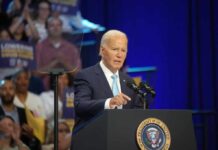
In a surprising turn of events, former Centers for Disease Control and Prevention (CDC) Director Robert Redfield has endorsed Robert F. Kennedy Jr. to lead a proposed Commission on Childhood Chronic Disease. This support comes despite Kennedy’s previous criticisms of Redfield and the CDC. The endorsement aligns with former President Donald Trump’s suggestion to appoint Kennedy to the position.
Kennedy shared his reaction to Redfield’s backing in a video posted on X, formerly known as Twitter. He described their recent lunch meeting as their first encounter, during which Redfield reportedly told him, “You got everything right.” Kennedy expressed astonishment at the endorsement, calling it “breathtaking.”
In an op-ed published on September 24, Redfield advocated for Kennedy to head the commission, emphasizing the urgent need to address the declining health of American children. He wrote that the suffering and death caused by chronic diseases among kids could be alleviated under Kennedy’s leadership. Redfield believes that a focused effort could eliminate the overwhelming burden these diseases place on the nation.
Redfield also echoed Kennedy’s concerns about “agency capture,” where government agencies are unduly influenced by corporate interests. He pointed out that the Food and Drug Administration (FDA) receives a significant portion of its funding from pharmaceutical companies. Additionally, he noted that scientists at the National Institutes of Health (NIH) benefit financially from drug royalties. These financial ties, according to Redfield, compromise the integrity of these institutions.
The former CDC director didn’t stop there. He criticized the U.S. Department of Agriculture for favoring large corporations over small farmers and public health. Redfield’s comments align with Kennedy’s longstanding critiques of government agencies prioritizing corporate profits over the well-being of citizens.
Kennedy, known for his activism in public health, has recently distanced himself from the Democratic Party. He has also scaled back his independent presidential campaign efforts. Instead, Kennedy has thrown his support behind former President Trump, believing that Trump’s “America First” approach can lead to a healthier nation. He envisions a “Make America Healthy Again” agenda that addresses the root causes of chronic diseases affecting Americans.
This unexpected alliance between Redfield and Kennedy signals a potential shift in how health issues might be addressed in the future. With both figures agreeing on the need for significant changes in government agencies, there could be increased pressure to reform how these institutions operate.
The endorsement has sparked discussions among conservatives, who see this partnership as a positive step toward challenging the status quo in public health policy. It remains to be seen how this collaboration will influence future health initiatives and whether it will lead to tangible changes in combating chronic diseases among children.

























